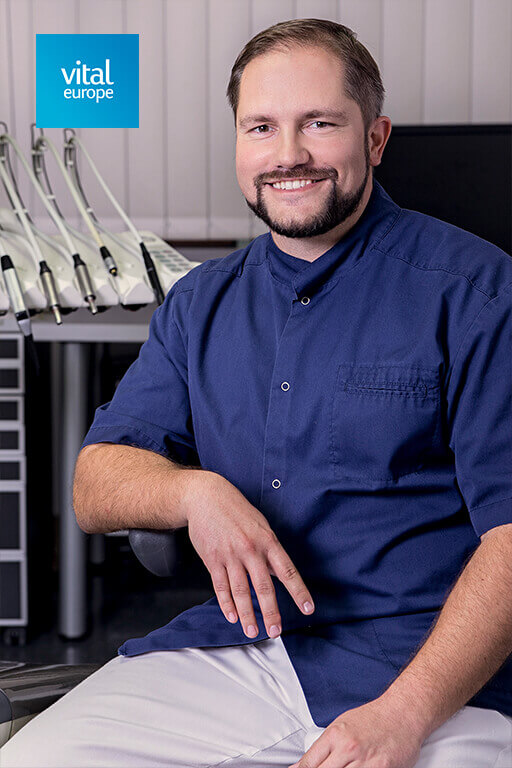“Helping people is a rewarding feeling. When someone has a healthy set of teeth, their quality of life improves, which also impacts their self-esteem and social relationships,” says Dr. Péter Dudás, the dentist at VitalEurope. He chose to specialize in prosthodontics and implantology because he can achieve remarkable results in a short period.

One of the most versatile branches of dentistry
“Professionally, this is one of the most complex and versatile areas in dentistry. It has many layers, and a deep understanding is required,” explains Dr. Dudás, who has been working at VitalEurope for ten years. He believes that foreign patients present the biggest challenge in his daily work. “The time for their treatment is always limited since they travel back home afterward. Deadlines must be met with the same high-quality and value-added work as for Hungarian patients.”

Incredible attention to detail
“What I love most about my job is when everything goes according to plan. This is interesting because a treatment consists of an incredible number of small details, so it’s not as simple as it may sound.”

The traits of a good dentist: Honesty and perfectionism
When asked about the qualities of a good dentist, Dr. Péter Dudás says, “A good dentist is honest with the patient, strict, consistent, and perfectionist in their work. Manual dexterity is beneficial, especially in prosthodontics. Kindness, empathy, and understanding are positive qualities, but they should not lead to excessive compromises that could adversely affect long-term results, durability, or quality. It is essential to mutually respect and value the patient, as it forms the basis of high-quality and precise work. I am satisfied with the outcome when my patient is fully content and during follow-up appointments, I can confidently say that there are no issues, just a need for plaque removal.”

The patient encounter
“The doctor-patient relationship always starts with an initial consultation, where the patient explains why they visited the clinic and what they expect regarding their dental health. A dental examination and, if necessary, X-rays or CT scans are performed at this stage. Based on this information, a personalized treatment plan is created, containing all the relevant details, including necessary treatments, their scheduling, costs, and other specifics. The patient receives this plan in printed form. The treatment itself takes place during subsequent appointments. I try to create a balanced, calm atmosphere during these visits, so that the patient can remain calm and cooperate.”
Outside of work, Dr. Péter Dudás enjoys tranquility. In his free time, he likes beekeeping, fishing, gardening, or cooking.